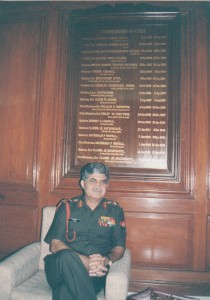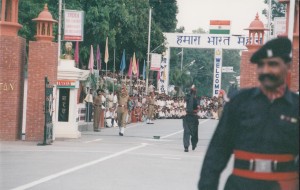AG. Do you feel that it was an increased sense of security threat inside India that led to these tests?
Gen. V.P. Malik. No there is no immediate threat. This has been debated over a long time. To go back to history, a country in our neighbourhood tested its first weapon in 1964 there after they have carried out 45-46 tests. If we are talking of a regional environment then there is another country – although they had not tested overtly there were very credible statements made by their Prime Minister, ex-PMs and chiefs and ex-chiefs saying ‘that we have it’. I can quote those statements—starting from ’90, ’92, ’94. Not only in theirown country, but even when they have gone abroad they have made those statements.

Then there has been the pressure that we shall have people who have it and we shall have others who will not have it. So a lot of these factors came into play when the decision was taken—but if you’re asking whether there was any military threat, immediately, no. Our threat today primarily is in terms of terrorism, militancy, a proxy war as we call it—sponsored by a neighbour—which has got nothing to do with the nuclear tests.
AG. You must be aware that some military theorists believe that a nation that acquires nuclear weapons only increases its vulnerability. After these explosions there have been many more skirmishes along the border: do you think there is any connection?
Gen. V.P. Malik. No, I don’t think there is any connection whatsoever. Although we heard these voices in our neighbourhood that we have it, now of course they say we heightened it. As I said please do not connect nuclear weapons with militancy or terrorism. In the last few years the intensity of proxy war has gone up, it has been going up for quite sometime. If so many massacres are taking place now—that has got nothing to do with nuclear weapons. [It is] because they think Jammu and Kashmir is their problem and because they want to internationalise that problem and put more and more pressure on us.
I don’t think any sane military man would look at nuclear weapons for a thing like this. I haven’t seen any such statement from any professional on either side of the border. Some other people might have said it, but no military professional has connected these 2 issues.
AG. There is a point of view that says that conventional armies increasingly find it difficult to deal with low-intensity warfare: their tactics and strategies are such that conventional armies find it impossible to respond. Is this the case?

Gen. V.P. Malik. Well, its not easy—because lately the number of low-intensity conflicts that are happening in the world has risen, especially after the end of the Cold War.There must be around 35 or 36 places where such conflicts are going on.
So far as terrorists are concerned, they have no accountability, they can win or they can lose. As far as armies are concerned, they are accountable for a lot of things including human rights. Also since they are last instrument of the nation, they have to win, they cannot afford to lose, so there is a pressure on the armies. But let me also say that the Indian army hasn’t done too badly—we had a problem in Punjab which we managed to overcome…..But the peculiar situation in Jammu and Kashmir is that it is very heavily sponsored from outside. So it might take time, but I’m an optimist. In a way we’ve gained quite a lot because elections were held, first the state assembly and thereafter the Parliamentary elections, and in J and K today you have an elected Chief Minister, and representatives in the Lok Sabha. In the whole of the state it is the writ of the civil authority which runs—barring these incidents created by the militants and the situation even as far as tourism is concerned in the state, this year I believe we have had the largest number of tourists in many years. So today the situation there is that the locals are less interested in carrying on with those who were brainwashed.
